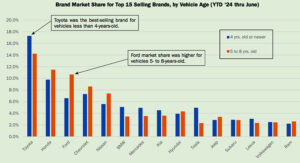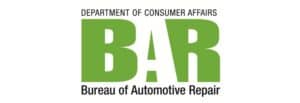Every year, hundreds of new laws are enacted that impact California automotive repair dealers. Here is a brief summary of some key measures and programs that take effect January 1, 2021, unless otherwise noted
Editor’s note: This list was compiled by Jack Molodanof, ASCCA legislative advocate. To learn more about ASCCA and its benefits, visit www.ascca.com
- Minimum Wage Increase. Reminder that effective January 1, 2021, the minimum wage for employers with 26 or more employees will increase to $14.00 per hour. The minimum wage for employers with 25 or fewer employees will increase to $13.00. (SB 3 of 2017). Note that local minimum wage ordinances may be higher.
- BAR Auto Shop Locator Program. In August this year, BAR launched a new auto shop locator program where consumers can easily find auto repair services in their area using a mobile-friendly search tool and also see any disciplinary actions against the shop. The locator displays shops on an interactive map using the consumer’s location or a specific city or zip code. Service categories are tied to primary and secondary business type information (e.g. auto body, tire, transmission repair, etc.) provided by the automotive repair dealers upon licensure or renewal.
- Smog Check Repair/Consumer Assistance Program (CAP). Emergency BAR regulations (vehicles that fail smog) increased the vehicle retirement option to $1,500 for owners that meet income eligibility and all others receive $1,000. The regulations also increased the repair assistance contributions to $900 or $1200 depending on the vehicles model year. (16 CCR 3394.3; 16 CCR 3394.4; 16 CCR 3394.6)
- Vehicle Safety Recall Information Added to Smog Check. In May of this year, BAR On-Board Diagnostic Inspection System (BAR-OIS) analyzers received a Vehicle Information Database (VID) update providing access to vehicle-specific recall information from the Vehicle Recall Search Service. Recall information provided includes the recall date, campaign number, and a description of the recall to aid the repair. The recall results are displayed to the Smog Check inspector and are also printed on the Vehicle Inspection Report a copy of which must be provided to the consumer.
- Business Hiring Tax Credits. This law will provide small businesses (fewer than 100 employees) a $1,000 tax credit if they hire or rehire an employee for the 2020 taxable year. The law sets aside $100 million and will be provided to businesses that qualify under first-come, first served basis. (SB 1447)
- Employee Notification-COVID-19. This law requires public and private employers to, among other things, notify all employees and subcontractor employees, within one business day, regarding potential exposure to COVID-19. It establishes standards that employers must follow in handling potential COVID-19 exposures and outbreak and provides the Cal-OSHA with oversight to protect employees and enforce the law. Violators will be subject to fines. (AB 685)
- Cal/OSHA COVID-19 Emergency Standards. Effective November 30, 2020, the new Cal/OSHA standards, among other things, require employers to prepare, implement and maintain a written COVID-19 Prevention Program. Even if employers have implemented a COVID-19 response plan, many of the new requirements likely change or expand the policies and procedures that employers have implemented previously. (8 CCR 3205-3205.4)
- Workers Compensation – Coronavirus. This law creates a “disputable” presumption, meaning that it is presumed that contraction of coronavirus is a workplace injury but may be controverted by other evidence. The law is retroactive and applies from the time the Governor’s similar Executive Order expired (July 6, 2020). The law took effect immediately upon signing by Governor. (SB 1159)
- Expansion of California Rights Act. This new law requires employers, with at least 5 employees, to grant an employee up to 12 weeks of unpaid leave for family care and requires the employer to reinstate the employee returning from leave to the same or comparable position. (SB 1383)
- Independent Contractors. This law revises various aspects of last year’s AB 5. Among other things, the law clarifies the business to business exception and adds list of new exemptions. It also clarifies that a sole proprietorship may qualify for the busines to business exemption. The law took effect immediately upon signing by Governor. (AB 2257)
- Corporate Board of Directors. This law requires publicly held corporations whose principal executive office is in the state of California to include at least one director from underrepresented communities on its board by the end of 2021. (AB 979)
- Employment Practices- Leave Time. This law expands protections afforded to an employee who is a victim of domestic violence, sexual assault, or stalking to an employee who is victim, as specified, and to an employee whose immediate family member is deceased as a direct result of a crime. (AB 2992)
- Lead Acid Battery Recycling Facility and Cleanup Program. This new law makes clarifying changes to the Lead Acid Battery Recycling Act and revises the Lead Acid Battery Recycling Facility Investigation and Cleanup Program to expand requirements for the Department of Toxic Substances Control (DTSC) to receive and respond to information from the public and provides additional time for DTSC to compete or renew investigations. It also authorizes money to be available and expended. (AB 2104)
- Time to Bring DLSE Complaints Expanded. Existing law authorizes people who believe that they have been discharged or otherwise discriminated against in violation of any law enforced by the Labor Commissioner to file a complaint with the Division of Labor Standards Enforcement (DSLE) within six months after occurrence of the violation. This new law extends the period to file a complaint to within one year after the occurrence of the violation. (AB 1947)
- California Consumer Privacy Act (CCPA) Amendments. The California Consumer Privacy Act (CCPA) of 2018 provided consumers certain privacy rights with respect to personal information collected by businesses. These new laws clarify and extends certain exemptions provided in the original CCPA for personal information collected and shared employment. (AB 713) (AB 1281). On August 14, 2020, the Attorney General announced that the Office of Administrative Law approved implementing CCPA regulations. Finally, recently passed Proposition 24 expands the state consumer protection data privacy laws and creates a new Privacy Protection Agency to enforce these laws.
- Sick Leave: Kin Care. This new law provides that when an employee takes sick leave to attend to the illness of a family member, the designation of sick leave is at the sole discretion of the employee. (AB 2017)
- Small Employer Family Leave Mediation Pilot Program. This new law, among other things, requires the California Department of Fair Employment and Housing (DFEH) to create a small employer family leave mediation pilot program which would authorize a small employer or employee to request all parties to participate in mediation through the DFEH’s dispute resolution division. (AB 1861)
- Unemployment and Insurance and Work Sharing. This new law creates an alternative, expediated process which employers may apply and participate in California’s work-sharing program. (AB 1731)
- Statement of Information Reporting Wage and Hour Violations. This new law requires that as of January 1, 2022 or the date the Secretary of State certifies that California Business Connect is implemented, every corporation must include in its statement of Information a statement indicating whether any officer or director, or in the case of a limited liability corporation, a manager or member, has an outstanding final judgment issued by the Division of Labor Standards Enforcement or court of law for the violation of any wage order or provision of the labor code. (AB 3075)
- Discrimination and Harassment. The new law clarifies when a no-rehire provision in a settlement agreement regarding harassment, sexual assault or criminal conduct is permitted and requires certain employer documentation. (AB 2143)
- Small Employer Family Leave and Supplemental Paid Sick Leave. This new law, among other things, creates a small employer family leave mediation pilot program and creates the COVID-19 Supplemental Paid Sick Leave for hiring entities that have 500 or more employees in the U.S. The law took effect immediately upon signing by Governor. (AB 1867)
This summary has been provided for informational purposes only and is not intended and should not be construed to constitute legal advice.












Comments are closed.